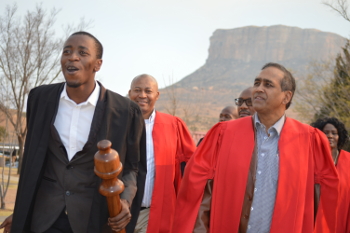
Newly-elected SRC President, Masopha Hlalele, leading a
ceremonial walk to the SRC chambers for the first sitting
of the SRC.With him is the Director: Student Affairs,
Temba Hlasho;IEA Chairperson, Grey Magaiza; and
Campus Principal, Prof Prakash Naidoo.
Photo: Thabo Kessah
The 2017/2018 Student Representative Council (SRC) elections on the Qwaqwa Campus of the University of the Free State (UFS) have been declared free, fair, and credible. This was announced by the Chairperson of the institutional Independent Electoral Agency (IEA), Grey Magaiza, during the official announcement of the results and the hand-over ceremony held on 4 September 2017.
“We had an average voter turnout of 52% per elective portfolio, thus making it arguably one of the highest in the country. Compared to last year, there was a 15% increase notwithstanding the 23% increase in the student population,” he said.
In congratulating the newly-elected SRC, the Director of Student Affairs, Temba Hlasho, challenged the student leaders to leave the campus intact and fully sustainable for future generations.
“You are now faced with the mammoth task of understanding your role in developing an ethical and moral leadership that will help to sustain the university academically, financially, and beyond.”
In his response, the new SRC President, Masopha Hlalele, acknowledged the role played by the previous SRC, and said they were prepared to usher in a new phase of turning each student into a proud ambassador of the campus.
“We will be ushering in a new phase where all students will be the focus of the SRC. This will be a phase where students will not discriminate against each other, but appreciate each other’s differences and become ambassadors,” he said.
The South African Students’ Congress (Sasco) won all seven elective seats with an average of 62.5%.
Elective portfolios:
President: Masopha Hlalele
Deputy President: Sakhile Mnguni
Secretary General: Mawande Mazibuko
Treasurer General: Mafusi Mosia
Media and Publicity: Khethukuthula Thusi
Student Development and Environmental Affairs: Mbali Ndlovu
Politics and Transformation: Promise Mofokeng
Ex officio portfolios:
Arts and Culture: Khulani Mhlongo
Religious Affairs: Ndamulelo Muthaki,
RAG, Community and Dialogue: Mafeka Tshabalala
Residence and Catering Affairs: Thato Moloi
Sports Affairs: Sibusiso Nsibande
Academic Affairs: Mamokete Tamo
Off-Campus: Khethwa Mngezi